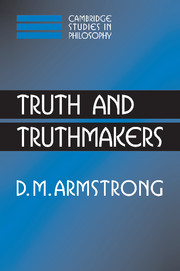Book contents
- Frontmatter
- Contents
- Preface
- 1 An introduction to truthmakers
- 2 The general theory of truthmaking
- 3 Epistemology and methodology
- 4 Properties, relations and states of affairs
- 5 Negative truths
- 6 General truths
- 7 Truthmakers for modal truths, part 1: possibility
- 8 Truthmakers for modal truths, part 2: necessity
- 9 Numbers and classes
- 10 Causes, laws and dispositions
- 11 Time
- References
- Index
2 - The general theory of truthmaking
Published online by Cambridge University Press: 22 September 2009
- Frontmatter
- Contents
- Preface
- 1 An introduction to truthmakers
- 2 The general theory of truthmaking
- 3 Epistemology and methodology
- 4 Properties, relations and states of affairs
- 5 Negative truths
- 6 General truths
- 7 Truthmakers for modal truths, part 1: possibility
- 8 Truthmakers for modal truths, part 2: necessity
- 9 Numbers and classes
- 10 Causes, laws and dispositions
- 11 Time
- References
- Index
Summary
INTRODUCTION
We have noticed already that simply to accept the idea that truths have truthmakers by no means dictates just what these truthmakers are. The question what truthmakers are needed for particular truths (what we take to be truths!) can be, and regularly is, as difficult as the question of metaphysics, the question of ontology. To ask the truthmaker question is, I maintain, a promising way to regiment metaphysical enquiry. But it is not a royal road. No such roads are available in philosophy. In this work I will defend various particular answers to the truthmaker question, sometimes (but not invariably) defending metaphysical positions that I have advocated in earlier work, but here always putting the truthmaking question at the centre. All the more reason then, to distinguish between the general theory of truthmaking and particular answers that may be given to truthmaking questions. The division is not all that sharp. There is, very properly, interaction between one's general theory of truthmaking and the particular truthmakers one postulates for particular classes of truths. The two enterprises have to be brought into reflective equilibrium. But it does seem worthwhile to make the distinction, and this chapter will be given over to the general theory with only glances at particular doctrines.
HISTORICAL
The notion of the truthmaker may be traced right back to Aristotle. (See, in particular, Categories, 14b, 14–22.
- Type
- Chapter
- Information
- Truth and Truthmakers , pp. 4 - 25Publisher: Cambridge University PressPrint publication year: 2004



